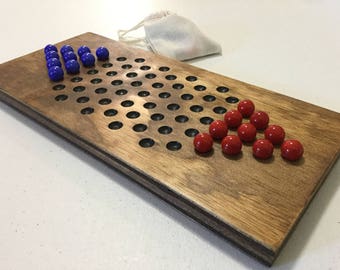Play Game Of Chinese Checkers
Chinese checkers (US and Canadian spelling) or Chinese chequers (UK spelling) is a strategy board game of German origin (named 'Sternhalma') which can be played. How to Play Chinese Checkers. Chinese Checkers is a game in which players race each other to see who can fill their destination triangle with colored pegs. Jun 21, 2009 Watch more Board Games videos: Neither Chinese nor checkers, Chinese checkers is a fun.
The Rules of Chinese Checkers Equipment The Chinese Checkers or Chinese Chequers board is in the shape of a six pointed star. Each point of the star is a triangle consisting of ten holes (four holes to each side). The interior of the board is a hexagon with each side five holes long. Each triangle is a different colour and there are six sets of ten pegs with corresponding colours. Preparation Chinese Checkers can be played by two, three, four or six players. The Complete Basketball Strength And Speed Program more. Obviously, for the six player game, all pegs and triangles are used.

If there are four players, play starts in two pairs of opposing triangles and a two player game should also be played from opposing triangles. In a three player game the pegs will start in three triangles equidistant from each other. Each player chooses a colour and the 10 pegs of that colour are placed in the appropriately coloured triangle. Many rules state that any unused triangles must be left populated with their unused pegs so that they cannot be used during the game. We suggest that the game is slightly more interesting if unused triangles are left empty so that pegs can hop through and come to rest in them, if desired. Objective The aim of the game is to be the first to player to move all ten pegs across the board and into the triangle opposite. The first player to occupy all 10 destination holes is the winner.
Play A toss of a coin decides who starts. Players take turns to move a single peg of their own colour. In one turn a peg may either be simply moved into an adjacent hole OR it may make one or more hops over other pegs. Where a hopping move is made, each hop must be over an adjacent peg and into a the vacant hole directly beyond it. Each hop may be over any coloured peg including the player's own and can proceed in any one of the six directions.
After each hop, the player may either finish or, if possible and desired, continue by hopping over another peg. Occasionally, a player will be able to move a peg all the way from the starting triangle across the board and into the opposite triangle in one turn! Pegs are never removed from the board. However, once a peg has reached the opposite triangle, it may not be moved out of the triangle - only within the triangle. Pradeep Class 12 Physics Book Pdf on this page. The question soon arises as to whether it is possible to move a peg into a triangle that is the starting or target triangle for another player.
House rules apply but Masters Games suggests the following: A peg can be hopped through such a triangle but is not allowed to come to rest in that triangle. Anti-Spoiling Debate has always arisen over the situation where a player is prevented from winning because an opposing player's peg occupies one of the holes in the destination triangle. Most Chinese Checkers rules omit to mention this - implying that it is perfectly legal to block opponents in this dubious fashion. A number of anti-spoiling rules have been proposed - one work-around is to say that should one or more of the holes in the target triangle contain a peg belonging to another player, this does not prevent a player from winning. The game is simply won when all the available points within the triangle are occupied. Masters Games suggests the following additional rule invented by James Masters in 2002 which is wide enough to capture all such situations: If a player is prevented from moving a peg into a hole in the destination triangle because of the presence of an opposing peg in that hole, the player is entitled to swap the opposing peg with that of his own peg. This applies for both a single hole move and any part of a hopping move.
Variations For a more involved game, when three players play, each player can control two sets of pegs instead of one. Coleccion De Partituras Para Guitarra Clasica Pdf more. Two players can control three sets of pegs each.